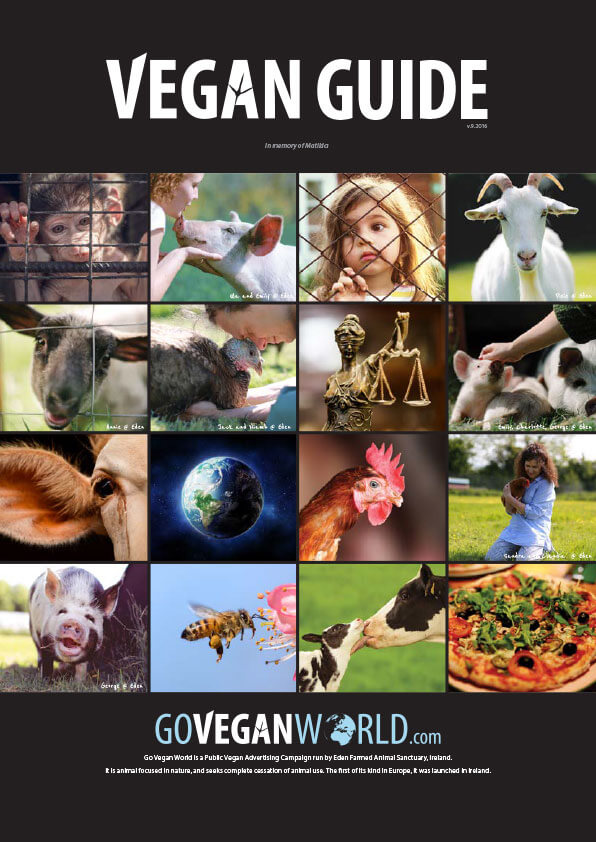Why Vegan?
Other animals share our capacity to think and feel. They are aware of themselves and of the world and they value their lives. Therefore, they share the fundamental right not to be owned, used, bred, harmed or killed.
There is no ingredient in the lives or bodies of other animals that humans need for survival, health or happiness. Therefore, we use them for reasons that are trite and unjustifiable such as taste, convenience, habit, tradition, and culture.
Vegans do not use other animals for food, clothing, entertainment or other purposes, insofar as it is possible and practicable to do so. Veganism is not a matter of personal purity. It is simply the least we can do to stop harming others.
Veganism is not an act of charity. It is not about compassion so much as it is about justice and fairness. There is nothing heroic or special about vegans; they do not live abstemious lives; they merely live in a way that accords others their basic rights. Neither is veganism some distant goal, that we work towards in small stages. The goal is the liberation of non-humans from human oppression, and their full recovery from the effects of our use of them. Veganism is simply the least we can do to begin that process.
Being vegan means acknowledging and securing for others the basic rights that we demand for ourselves: the right to live free of oppression, the right not to be owned, used or exploited by another; the right not to be harmed or killed; and the right to life.
This website will help you to become vegan, and facilitate you to play your role as an advocate for others in one of the most important social justice movements of our time.
Further information is available on the following pages:
Sentience
The most important aspect of veganism is the recognition that other animals share our capacity for sentience. Sentience is the capacity for feeling and conscious awareness.
In July 2012 The Declaration of Consciousness in Non Human Animals was signed by some of the most world’s prominent scientists. It stated
“Convergent evidence indicates that non-human animals have the neuroanatomical, neurochemical, and neurophysiological substrates of conscious states along with the capacity to exhibit intentional behaviours. Consequently, the weight of evidence indicates that humans are not unique in possessing the neurological substrates that generate consciousness. Non-human animals, including all mammals and birds, and many other creatures, including octopuses, also possess these neurological substrates.”
When we examine the bodies and lives of other animals it is very easy to recognise what we have in common. We share major sense organs: eyes, ears, nose, mouth, skin. These are the organs that we all use to perceive the world around us and to feel. We have other organs in common too: heart, lungs, kidneys, liver and, significantly, brains. Sense organs interact with brains to maximise our chances of survival; to make life as peaceful and pleasurable as possible and to avoid suffering, harm and death.
This process is the same in other animals as it is in humans. Even an animal who looks different to humans, such as a chicken, lives his or her life in much the same way as a human. They have social relations with other chickens, they feel emotions such as fear and joy. Their brain structures may be different but they process information in the same way as our primate brains.
However, our moral obligations to them do not rest on how similar we are. It is sufficient to know that we share sentience. Despite superficial differences in appearance, we all want to be happy, avoid suffering, and live to the end of our natural lifespan.
“We engage in speciesist thinking when we claim that a being must have a humanlike mind to count morally. That is, it is speciesist to claim that a being must have a reflective sense of self awareness, or conceptual thought, or the general ability to experience life in the way that humans do in order to have the moral right not to be used as a resource. As long as there is someone there who is subjectively aware and who, in that being’s own way, cares about what happens to him or to her, that is all that is necessary to have the moral right not to be used as a resource.”Gary Francione on Sentience
Speciesism
No one’s life is worth more than another life. For many years we have used our difference to and distance from others in an attempt to justify inequality. Racism, sexism, heterosexism, ageism, and all other forms of discrimination are forms of violence that thrive because we view others as different, and regard their lives as being of lesser value to them than our lives are to us.
In 1973 Richard Ryder coined the word speciesism to reflect our misplaced notion of human supremacy.
‘Speciesism‘ is a prejudice or bias in favour of the interests of members of one’s own species and against those of members of other species.
Speciesism judges others based on their membership of categories of species other than human, and fails to take account of them as individual persons.
Joan Dunayer, in her book Speciesism, defines it as:
A failure, in attitude or practice, to accord any non human being equal consideration and respect.
Animal Rights?
Because other animals are sentient they have the right not to suffer unnecessarily. They have the right to their life. They have the right to be free of human oppression. The most significant problem that they face is their legal status as human property. Dating from the time when we first domesticated other animals, 10,000 – 12,000 years ago, we have regarded ourselves as their owners. We control their lives and we are legally entitled to treat them as we wish. We profit from them in such numbers that they are thought of as commodities or inanimate things instead of sentient beings like us. They are spoken of as ‘it’ and ‘things’ instead of ‘him’ or ‘her’ or ‘someone’. They are referred to in terms of ‘crops’, that are ‘harvested’ at a ‘factory’, yielding a ‘kill out weight’. Fishes and chickens are not even counted as individuals; their only value being the weight of their bodies and the profit to those who exploit them.
Rights are about equal consideration and respect. Rights are secured when we embrace and celebrate difference, when we take cognisance of the equality of those we don’t know individually or who are distant from us, and when we recognise that in all the ways that matter, we are essentially all the same.
This has been true in securing women’s rights, civil rights, and other human rights. Now it is the turn of the other animals to secure their rights.
You can be part of this, the most important social justice movement of our time, beginning with the simple changes in your life that make you vegan.
Veganism
The word vegan was coined in 1944 by Donald Watson. The name was derived from the first three and the last two letters of the word ‘vegetarian’. Living vegan was promoted as a way of living that avoided the unnecessary suffering entailed in all use of other animals. It sought to eliminate the suffering and injustice on which vegetarianism is predicated by the fact that it avoids using other animals for their flesh but does not claim that animals use per se is morally wrong or that the suffering entailed in the consumption of eggs, dairy, and honey or in using other animals as clothing, or in entertainment or research is unacceptable.
“Veganism is a way of living which seeks to exclude, as far as is possible and practicable, all forms of exploitation of, and cruelty to, animals for food, clothing or any other purpose.”
But veganism has an older history than 1944. This is based on the philosophy of Ahimsa or non-violence towards other animals and the earth. In this sense, veganism is so much more than a diet or lifestyle. It is a way of living that embodies peace.


